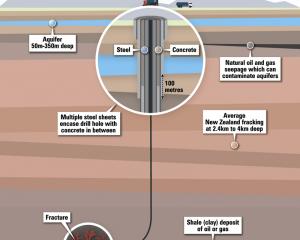Almost $12 million has been spent by Meridian Energy so far on its proposed north bank tunnel power scheme on the lower Waitaki River.
However, the cost would have been far greater if Meridian had not been able to utilise research and studies done during its investigations into the Project Aqua power scheme, which it cancelled in March, 2004.
Of the $11,854,907 Meridian has spent on the north bank proposal, about $1 million went on the Environment Court hearing in June and July when the Lower Waitaki River Management Society appealed four water-only consents granted by Environment Canterbury late last year.
The Otago Daily Times requested under the Official Information Act the amount spent so far on the proposed project, a 34km long tunnel with one power house between the Waitaki dam and Stonewall on the north bank of the river, which Meridian has estimated could cost almost $1 billion to construct.
It also asked Meridian how much the Environment Court hearing had cost and whether the costs were lower than expected because of research and studies done during Project Aqua.
Meridian said the almost $12 million it had spent on the scheme included costs from the engineering pre-feasibility study stage through to securing the water-only resource consents and Environment Court appeal.
"The costs [of the scheme] were likely reduced because of the research and studies during Project Aqua," Meridian said.
However, while the environment work for Project Aqua provided base information, the tunnel project was a different scheme with different issues. In addition, the introduction of didymo into the Waitaki River after Project Aqua was cancelled required additional studies on a variety of issues.
Meridian estimated it spent about $95 million on the investigations, research, studies, engineering and resource consents for Project Aqua, which had been estimated to cost $1.2 billion to build. It announced the project in April 2001.
Of that $95 million, about $50 million was spent buying land along the route of the 64km canal and its six powerhouses on the south side of the river between an intake at Kurow and outfall about 2km above the State Highway 1 bridge.
Last year, that 3100ha of land, some of which Meridian was selling, had increased in value to up to $130 million, depending on how much had been developed and for what use.
The total was spread over 29 properties, ranging from lifestyle residential blocks to farms. They include a dairy farm developed by Meridian to showcase energy efficiency and a new dairy run-off property near Duntroon.
Last year, Meridian had offered for sale or sold almost 900ha of its Waitaki Valley holdings. About 250ha was subject to buy-back clauses in contracts with previous owners, offering first right of refusal if the properties were sold.
When Meridian announced the north bank tunnel scheme project in 2005, it adopted a different approach.
It decided to apply for water-only consents first, concentrating on obtaining those before getting into detailed engineering work which would have been a waste of money, had water not been available to the scheme.
In an interim decision on September 21, the Environment Court granted those consents, subject to negotiation of conditions covering wetlands and birds in braided rivers.
Meridian still needs land use consents from the Waimate District Council to build the tunnel scheme. It has started the first stage in a major feasibility study which, among other things, would include detailed designs and costings.
If land use consents are granted, Meridian would still have to decide whether the scheme was commercially viable and build it. At the earliest, that will not take place before 2012.
If the scheme is built, the earliest it will be generating electricity is 2020.
POWER PLAYS
North Bank scheme
• Estimated construction cost: Almost $1 billion.
• $11,854,907 spent so far (includes $1 million spent on Environment Court hearing June-July).
Project Aqua
• Estimated construction costs $1.2 billion. Proposal cancelled in March 2004.
• $45 million spent on investigations, research, studies, engineering and resource consents.
• $50 million spent buying 3100ha of land. Today's value, about $130 million.






